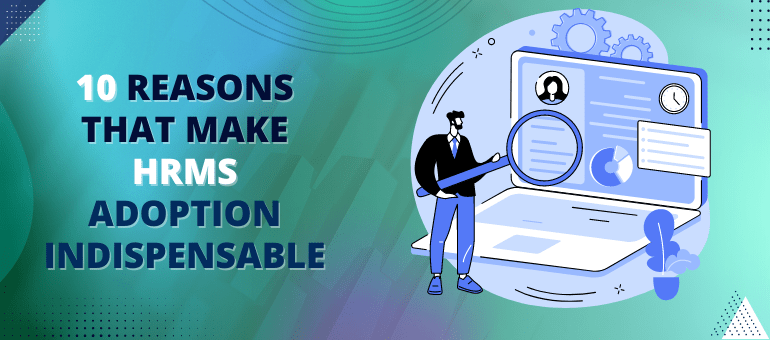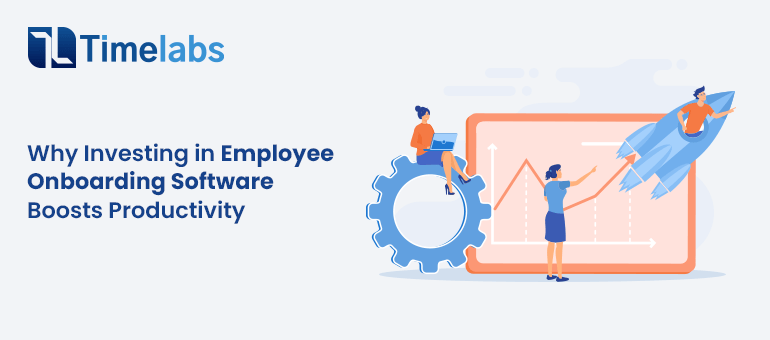Businesses must integrate human resource management systems (HRMS) into their everyday operations if they want to succeed in the contemporary corporate environment. An HRMS, or human resources management system, is a piece of software that can help a company achieve a number of business-related goals, like elevating employee engagement, appointing process compliances, and streamlining HR operations, among others.
For a number of reasons, the adoption of HRMS is essential in the current environment. Starting with payroll processing and continuing through onboarding new hires and benefit administration, HRMS has the capacity to automate a number of time-consuming HR tasks. Automating these tasks will free up more time for the human resources team to focus on crucial strategic objectives like employee development and talent management.
It is much easier to manage employee data and keep track of performance thanks to HRMS software’s central repository for all data related to human resources. Managers are better able to manage the resources at their disposal when they have real-time access to data on employee goals, performance, and development plans through the usage of an HRMS.
HRMS is known to be a key tool for enterprises who are looking forward to being efficient and competitive in their world. By using the latest technologies, the enterprises can minimize costing, improve efficiency, increase employee satisfaction and also ensure compliances. Here are the top 10 reasons why employing HRMS is important for employees:
1. Effective Data Management
A reputed HRMS system helps in managing the employees and company’s dedicated data from a single location. The data to be stored is inclusive of employee benefits, work history, responsibilities, and payments. In the future it will make it easier for HR departments to analyze and manage important data as well as make decisions by providing them with access to it in real time.
2. Increasing productivity
HRMS frees up HR practitioners to focus on more strategic HR tasks by automating time-consuming HR procedures like employee attendance tracking, payroll processing, and performance monitoring. When HR activities are automated with HR software, there are less mistakes made, more time is saved, and HR teams are more effective and productive. This is the reason why buying out HRMS software from a credible partner can help you in creating effective processes for your organization.
3. Abiding to laws
It is crucial for companies of all sizes to make sure they abide by all relevant labor laws and regulations. HRMS solutions can automate compliance-related duties, including reporting and record-keeping, which reduces the likelihood of compliance infractions and the associated legal repercussions.
4. Simplified Recruitment Procedures
Successful automating processes like keeping employees tracking, conducting background checks and posting jobs. It allows the HR departments to pace up the hiring processes, improving the new workers caliber and lowering down hiring costs.
5. Enhanced Performance Management Capability
The use of HRMS allows HR departments to manage and monitor employee performance at every level, from setting goals to giving feedback and performing performance evaluations. This gives human resources staff a more complete view of employee performance, enabling them to spot and proactively handle performance issues.
6. Analyze data
HRMS helps the HR department in creating the customized analytics reports giving them key insights in HR metrics. It allows them to track potential workforce demographics, employee engagement and also turnover rates. Human resources departments can use this information to make knowledgeable decisions about HR policy and practices.
7. Enhanced User Data Protection
HRMS solutions make it feasible to safely and securely store and manage sensitive employee data including social security numbers, salaries, and benefits. As a result, there is a lower chance of data breaches, identity theft, and other security risks.
8. Coordination is simpler
In order to enhance overall corporate performance and optimize HR departments, processes can work more productively with other departments, including finance, operations and IT thanks to HRMS systems.
9. Cost reduction
For enterprises, the installation of HRMS solutions can lead to significant cost savings. HR automation allows the procedure to reduce the need for human labor, which lowers administrative costs. It also reduces the possibility of mistakes or compliance violations, which over time results in significant cost savings.
10. Geographical Barriers
Enterprises that are established in various locations need to carry out their operations and taking help from HRMS software is a must for them. As the software can help them in operating effectively from any part of the world. The HR department can hire and manage the employees from any part of the world using these HRMS software.
Businesses who wish to enhance their overall performance, as well as streamline and reduce the costs connected with their HR processes, must use an HRMS. A number of advantageous results, including better productivity and efficiency, improved data management, increased regulatory compliance, and cost savings, can be attained through the implementation of HRMS solutions. As digitization of HR operations continues to advance quickly, businesses who do not use HRMS solutions run the risk of falling behind their rivals in terms of the efficacy and efficiency of the HR department.
By giving managers information they need to make informed decisions about workforce planning, talent development, and succession planning, an HRMS has the ability to enhance an organization’s overall performance. The final and most significant advantage of an HRMS is this. Utilizing the data supplied by HRMS to identify performance trends and skill gaps enables organizations to make more strategic decisions about the management and development of their workforce.
In conclusion, a human resource management system (HRMS) deployment is essential for enterprises in the contemporary world. By automating HR operations, centralizing HR data, raising employee engagement, and improving overall organizational performance, HRMS may help businesses achieve their strategic goals and keep their competitive advantage in the current market.



